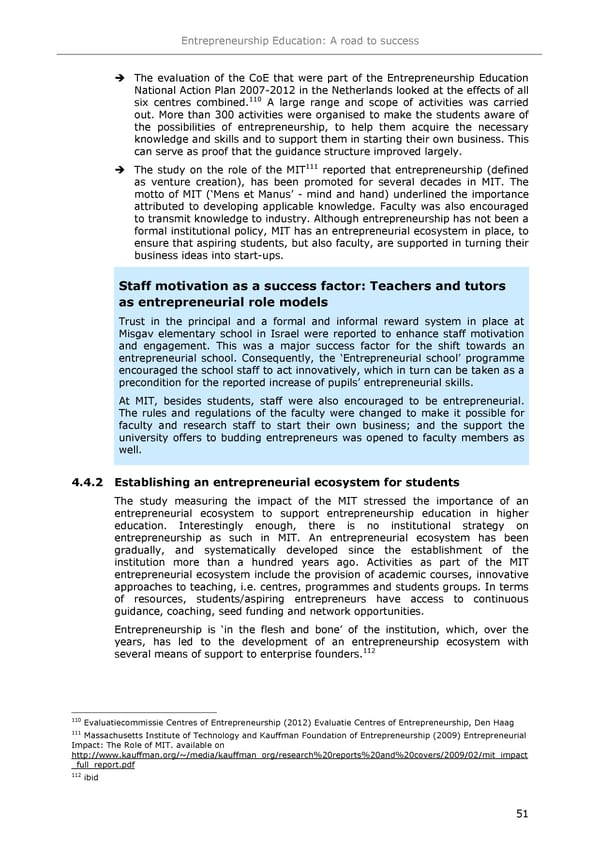Entrepreneurship Education: A road to success The evaluation of the CoE that were part of the Entrepreneurship Education National Action Plan 2007-2012 in the Netherlands looked at the effects of all 110 six centres combined. A large range and scope of activities was carried out. More than 300 activities were organised to make the students aware of the possibilities of entrepreneurship, to help them acquire the necessary knowledge and skills and to support them in starting their own business. This can serve as proof that the guidance structure improved largely. The study on the role of the MIT111 reported that entrepreneurship (defined as venture creation), has been promoted for several decades in MIT. The motto of MIT (8Mens et Manus9 - mind and hand) underlined the importance attributed to developing applicable knowledge. Faculty was also encouraged to transmit knowledge to industry. Although entrepreneurship has not been a formal institutional policy, MIT has an entrepreneurial ecosystem in place, to ensure that aspiring students, but also faculty, are supported in turning their business ideas into start-ups. Staff motivation as a success factor: Teachers and tutors as entrepreneurial role models Trust in the principal and a formal and informal reward system in place at Misgav elementary school in Israel were reported to enhance staff motivation and engagement. This was a major success factor for the shift towards an entrepreneurial school. Consequently, the 8Entrepreneurial school9 programme encouraged the school staff to act innovatively, which in turn can be taken as a precondition for the reported increase of pupils9 entrepreneurial skills. At MIT, besides students, staff were also encouraged to be entrepreneurial. The rules and regulations of the faculty were changed to make it possible for faculty and research staff to start their own business; and the support the university offers to budding entrepreneurs was opened to faculty members as well. 4.4.2 Establishing an entrepreneurial ecosystem for students The study measuring the impact of the MIT stressed the importance of an entrepreneurial ecosystem to support entrepreneurship education in higher education. Interestingly enough, there is no institutional strategy on entrepreneurship as such in MIT. An entrepreneurial ecosystem has been gradually, and systematically developed since the establishment of the institution more than a hundred years ago. Activities as part of the MIT entrepreneurial ecosystem include the provision of academic courses, innovative approaches to teaching, i.e. centres, programmes and students groups. In terms of resources, students/aspiring entrepreneurs have access to continuous guidance, coaching, seed funding and network opportunities. Entrepreneurship is 8in the flesh and bone9 of the institution, which, over the years, has led to the development of an entrepreneurship ecosystem with 112 several means of support to enterprise founders. 110 Evaluatiecommissie Centres of Entrepreneurship (2012) Evaluatie Centres of Entrepreneurship, Den Haag 111 Massachusetts Institute of Technology and Kauffman Foundation of Entrepreneurship (2009) Entrepreneurial Impact: The Role of MIT. available on http://www.kauffman.org/~/media/kauffman_org/research%20reports%20and%20covers/2009/02/mit_impact _full_report.pdf 112 ibid 51
 Entrepreneurship Education Page 54 Page 56
Entrepreneurship Education Page 54 Page 56